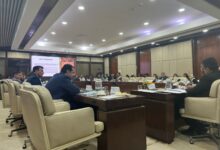Countering Plastic pollution: Bring your own bag
SAHIWAL: While standing on the beach in a fine evening of December, I was in deep sadden feeling. Colorful hawker carts, Bick rickshaws with traditional art and off course camel cart, everything was so fascinating but beach was sad and me too. Karachi beach always welcome the tourists with open warming heart but the way beach is being treated from years, it’s hurting. Every layer of water when touch your feet told you, its story. Where we expect to see the fish, sea shells or shinning tiny particles of sand, we just saw rappers, plastic bags, plastic bottles and garbage.
Plastic waste is a global crisis. one that’s growing more serious every day. Global plastic flows into oceans are expected to triple by 2040. And Pakistan alone produced an estimated 3.9 million tons of plastic waste in 2020. Around 70% of this plastic waste (2.6 million tons) is mismanaged, left to landfills, unmanaged dumps, or strewn about land and water bodies across the country.
Just imagine, you are watching a video of yourself, how you spend a day? From getting up to breakfast, from office to market and back home, how many plastic bags/ bottles you usually saw, touch or use even not bothering that how harmful these products are for our enviourment? No one bother about it.
In a rough estimate, each home in Pakistan at least uses, throw or purchase 5 to 8 products made of plastic or bought in plastic bags. Children’s most favorite junk food products are raped or packed in plastic bags. Every hawker sells his product in plastic bag. Every delivery currier service, packed their parcels mostly in plastic packets. Mineral water companies are not producing water, they are producing water bottles. A reality we are not ready to accept.
In 2019, the world bank in Pakistan started an amazing initiative by giving each staff member a reusable bag for daily use, whether they used it to carry work items into the office or for shopping on the weekend. Rather than use plastic bottles that would end up in landfills, they start using a used reusable water bottles at filter stations around the office.
This was not a difficult practice but a caring step towards our environment. But after 3years how many offices in capital initiate this practice?
Pakistan became one of 128 countries with a single-use plastic (polythene) bag ban in 2019. Pakistan ‘s ban paused the production of 600,000 kilograms per annum. This success credit was indeed goes to the efforts done by ministry of climate change and the Pakistan Environmental Protection Agency (EPA) ‘s awareness campaigns and educational campaigns for citizens and manufacturers, free distribution of alternative bags and off curse some fine imposed on the shopkeeper and buyer who caught using plastic bags in city.
These efforts got results. A survey conducted after a year in September 2020 showed that 80% of the participants felt that the ban had increased their knowledge on plastic pollution.
Theses practices in capital shows some other positive results when clothing brands start producing paper bags instead of plastic shopping bags.
Sapphire, a leading clothing brands in Pakistan took some great initiative by producing shopping bags with seeds, a totally environment friendly bag for customer and another good thing is that these bags are reusable. Another initiative this brand took this year is about the recycling of cloths. They start reproducing new cloths with the used fabric and asked their customers to give them back their useless cloths.
Pakistan’s climate change ministry has announced full support for innovative recycling initiatives to tackle the country’s mounting waste problem and promote an eco-friendly environment.
“Managing plastic waste requires us to not only reduce, reuse and recycle but also rethink innovative solutions to the menace of menace plastic waste and turn it into an economic resource.” said by Syed Mujtaba Hussain, the senior joint secretary at the ministry of climate change who is also leading anti-plastic bag campaign in Islamabad.
According to WWF in Pakistan’s an estimated 8 million tons of plastic waste enters the oceans every year. By 2050, it is expected that there will be more plastic in the oceans than fish. Plastics pose threat to nature by being non-biodegradable and toxic. A simple plastic bag can take up to 500 years to decompose while a plastic bottle can take around 300 years! Unfortunately, plastics account for 65 per cent of the total waste in Pakistan; 55bn plastic bags are being used in the country with an expected annual increase of 15 per cent in their usage.
Government is doing the best in collaboration with international organizations and innovative minds in country but what’s the responsibility of a common person, media and advertisement industry?
Number of ads run on television screen having plastic bottles, tins, plastic bags and any hazardous stuff for environment, anyone every took notice. From frozen food to energy drinks, from cookies to chips ads everything is indirectly promoting plastic. KFC start an initiative by starting paper straws, raped in papers and using paper cups for drinks but visit these leading food chance now, from ice cream cups to straws and lids of coffee and drinks you will find plastic. Things will take time but our young generations attractive brands like food, clothing or gaming if start environment friendly campaigns, change will be visible.
Let’s start a new campaign,” Bring your own Bag (BYOB)”, to promote the culture, a culture of our forefathers. Our 18s generation always bring their own handmade fabric zip bags whenever they visit market, means they save this environment for us but what we are saving for our new generation.
Let’s start using handmade fabric zip bags with the campaign BYOB. Let’s start charging the plastic bag. This will help a common person to bring their own bad and reuse the bags.






